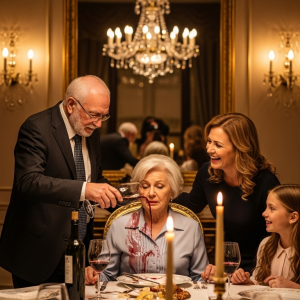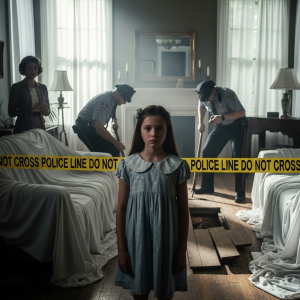The sun had barely begun to wash the grey from the city streets when Tim started his route. The 5:30 AM shift was a familiar beast, a slow-moving river of the same faces, the same tired eyes, the same quiet nods of acknowledgement. Tim was the invisible man in the driver’s seat of Bus 407, a silent witness to a thousand small, ordinary lives.
He knew the rhythm of the city by heart. The squeal of the brakes at Elm Street, the groan of the doors opening for the hospital workers at St. Jude’s, the smell of burnt coffee wafting from the corner diner. For twelve years, this had been his world: a six-ton metal box rolling through an urban sea, its passengers oblivious to the man who held their daily commute in his hands.
Tim was a man built of routine and quiet observation. He had a daughter, Lily, who was about to turn ten. Every morning, before leaving, he’d peek into her room and watch the gentle rise and fall of her breathing, a sight that armed him against the monotony of the day. Her face was the compass by which he navigated his world.
This morning felt no different. The radio hummed with traffic reports and news of a local bake sale. He sipped his lukewarm coffee from a thermos, the city waking up in his rearview mirror. He picked up the usual crowd: construction workers with dusty boots, nurses in crisp scrubs, and a handful of students with faces buried in their phones. It was just another Tuesday.
Or so he thought.
They got on at 7:15 AM, at a stop where few people ever waited. He was a tall man, thin and wiry, with eyes that darted around as if searching for threats. She was a small girl, swallowed by a dark, oversized hoodie that was completely wrong for the warm August morning. A chill, unrelated to the bus’s air conditioning, crawled up Tim’s spine.
The man pushed the girl forward toward the fare box, his hand gripping her upper arm with a firmness that was more like possession than protection. The girl kept her head down, her face obscured by the deep hood. She fumbled with the coins, her small fingers trembling. A few quarters clattered to the floor.
“Hurry up,” the man hissed, his voice a low, impatient growl.
The girl knelt to retrieve the coins. As she did, she was momentarily out of the man’s direct line of sight. She looked up at Tim, and for a single, searing second, their eyes met. Her eyes were a deep, frightened blue, pools of silent terror in a pale, small face. Her lips barely moved, forming a whisper so faint it was almost lost in the hiss of the bus’s air brakes.
“Please… help me.”
Three words. That was all. She dropped the coins into the machine and scurried back to the man, who guided her forcefully to a seat in the back. The moment was over. But for Tim, the world had tilted on its axis. The ordinary Tuesday was gone, replaced by a cold, terrifying reality.
Tim’s heart hammered against his ribs. The face of his own daughter, Lily, flashed in his mind—her laughing eyes, her trusting smile. Every paternal instinct in his body screamed at him to stop the bus, to confront the man, to snatch the girl away from him. But his training took over. Twelve years of procedure, of de-escalation drills, formed a dam against the flood of his panic. Any sudden move could make things worse. He had to be smart. He had to be calm.
He took a slow, deep breath, tightened his grip on the massive steering wheel, and guided the bus back into the flow of traffic. The hum of conversation and the rustle of newspapers from the other passengers created a bizarre cloak of normalcy. Thirty people on this bus, and only he and a little girl in a dark hoodie knew the truth: they were sharing the ride with a monster.
Tim drove, but his mind was racing, calculating, planning. His eyes flicked constantly to the wide rearview mirror, his gaze a silent promise to the small, huddled shape in the back. The man sat stiffly, his arm draped possessively around the girl’s shoulders. He never looked at her, only around the bus, his paranoia a palpable force.
The girl never looked up. She seemed to be trying to make herself smaller, to disappear into the worn fabric of the bus seat. Tim saw her hand clench and unclench in her lap, the only sign of the turmoil she must be feeling. He had to get her away from him. But how?
He couldn’t use his radio; the speaker was audible throughout the bus. He couldn’t just stop and call 911; the man would bolt, possibly dragging the girl with him. He needed a diversion. A plausible reason to halt the bus, to break the routine, to create an opportunity.
His eyes scanned his dashboard, the array of familiar buttons and switches. An idea began to form, a risky gambit that relied on his ability to act. As the bus approached a red light, Tim steeled himself and reached for the intercom microphone.
His voice boomed through the bus, steady and professional, betraying none of the adrenaline coursing through his veins. “Ladies and gentlemen, your attention please. We seem to be experiencing a minor issue with the door pressure sensors. For your safety, I’ll need to pull over at the next stop to run a quick diagnostic. I apologize for the brief delay.”
A collective, predictable groan rippled through the passengers. A man in a suit glanced impatiently at his watch. Tim didn’t care. The excuse was plausible enough. He had bought himself time.
He pulled the bus into the next stop, away from the curb, and engaged the emergency lights, their rhythmic flashing painting the cabin in strobes of amber light. The illusion of a normal commute was officially shattered. Now, it was his stage.
Tim stood up, stretching as if he were stiff. He gave the passengers a reassuring nod. “Should only be a moment, folks. While I’m at it, I’ve had reports the rear ticket validator isn’t scanning properly. Mind if I just check a few stubs back there?” He made it sound like a tedious, bureaucratic chore.
He started down the aisle, his footsteps unnaturally loud in the tense silence. He checked the ticket of a young woman near the front, sharing a quick, meaningless pleasantry. He was projecting calm, moving with a deliberate lack of urgency. But as he neared the back of the bus, he could feel the temperature drop. The tension radiating from the man was a physical presence.
He stopped at their row. The girl flinched, shrinking further into the man’s side. Tim avoided looking at her directly, focusing instead on the man.
“Sir, apologies for the trouble,” Tim said, his tone polite but firm. “I just need to see your tickets. The machine’s been flagging errors all morning.”
The man’s eyes narrowed into slits of cold fury. A muscle twitched in his jaw. “We paid our fare,” he snapped, his voice low and dangerous. His grip on the girl’s arm visibly tightened, his knuckles turning white.
“I’m sure you did,” Tim replied, maintaining his easygoing demeanor. “It’s not about you, sir, it’s about this faulty machine. Procedure, you know? They make us log the serial numbers. Tell you what, let me just radio it into the control room. They can probably verify it from their end.”
It was the perfect excuse. With a casual air, Tim turned slightly, using his body to shield his right side from the man’s view. His hand slipped into his pocket and closed around his phone. He brought it up to a maintenance panel on the wall of the bus, pretending to inspect it while his thumb deftly dialed 911.
He put the phone to his ear, feigning a conversation with a dispatcher. Under the hum of the bus’s engine, he spoke in a low, controlled voice to the 911 operator.
“This is Tim Sanderson, driver of Bus 407, eastbound on Maple Avenue. I have a Code Amber situation on board. Possible abduction. Male, late thirties, thin build. Victim is a female child, approximately nine years old. I am currently stopped between 5th and 6th street. Requesting immediate, silent police assistance.”
He gave a precise description of the man and the girl. He listened for a moment, then said, “Understood,” as if receiving instructions from his own control room. He ended the call and put the phone back in his pocket. The entire exchange took less than forty seconds.
He turned back to the man with an apologetic shrug. “Well, the system is down for a reboot. We’ll just have to wait it out. Sorry for the delay, folks.”
Tim walked back to the front of the bus, his heart pounding a frantic rhythm. The wait was agonizing. Every tick of the clock was an eternity. He sat back in his driver’s seat, his eyes locked on the mirror, watching the man, who was now visibly agitated, his leg bouncing nervously. The girl remained impossibly still.
That’s when he saw it. The businessman in the suit, the one who had been so impatient, was staring at him in the mirror. He had been close enough to hear everything. He met Tim’s gaze, and with an almost imperceptible movement, he gave a slow, single nod. I understand. I’m with you. A silent alliance was formed. A small wave of relief washed over Tim. He wasn’t alone in this anymore.
Minutes later, which felt like hours, he saw them. Two police cruisers sliding silently to a stop about a block ahead, no lights, no sirens. They were here.
Tim took another deep breath and opened the doors with a loud hiss. “Alright folks, looks like we’re back in business!” he announced cheerfully. “Thanks for your patience.”
But it wasn’t a passenger who got on. Two uniformed police officers stepped quietly onto the bus, their expressions calm but resolute.
The man’s facade of irritation instantly crumbled, replaced by a mask of pure, animal panic. He shot up from his seat, but the second officer was already halfway down the aisle, blocking his only path of escape. His defiance wilted under the quiet authority in the officers’ eyes.
“Sir,” the first officer said, his voice leaving no room for argument. “Please place your hands where I can see them.”
Tim watched in his mirror as they expertly and quietly apprehended the man. A female officer had entered behind them, and she went directly to the little girl. She knelt, speaking in a soft, gentle voice, and wrapped a warm blanket around her small, trembling shoulders.
The girl finally looked up. Her hood fell back, revealing a tear-streaked face and a bruise blooming on her cheek. She looked past the officers, her eyes searching for and finding Tim’s in the mirror. There were no words, but her expression, a profound mixture of relief and gratitude, was something Tim would carry with him for the rest of his life.
They led the man off the bus. The girl followed with the female officer, who held her hand gently. As she stepped onto the pavement, she took one last look back at the bus, at the invisible man in the driver’s seat who had chosen to see her.
The bus doors hissed shut. Life, for the other passengers, resumed its relentless march forward, now with a buzz of shocked and excited chatter. Tim pulled away from the curb, his hands steady on the wheel once more. The morning sun was higher in the sky now, seeming brighter than before.
The route was the same, but Tim was not. In the quiet hum of his bus, the echo of a little girl’s whispered plea remained—a testament to the fact that sometimes, the most extraordinary courage is found in the most ordinary of days. Tonight, he knew he would be holding his daughter Lily just a little bit tighter.




